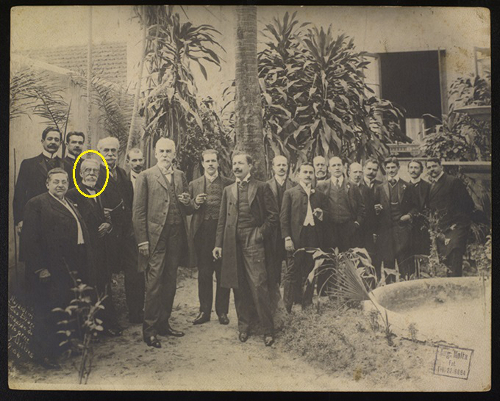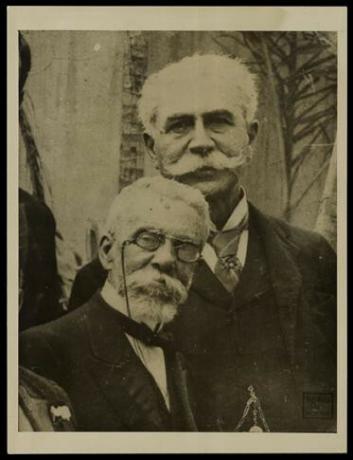Joaquim Maria Machado de Assis was born in Rio de Janeiro, capital, on June 21, 1839. He was the son of Francisco José de Assis, a mixed-race black and Portuguese worker, and Maria Leopoldina Machado de Assis, who died when the writer was still very young. He was raised by his stepmother, Maria Inês, who took care of the fragile child, as Machado suffered from epilepsy. After his father's death, he started to help his stepmother in the sale of sweets that she prepared herself, the only source of income for the family. While selling the sweets, he studied, and even then, facing so many difficulties, did he drop out of school.

Machado de Assis stands out among his fellow writers and intellectuals. Photo from the National Library collection.
Machado's first book was published in 1861, Fall that women have for fools. After that came many other books, titles that make up a work that immortalized the writer, nicknamed Bruxo do Cosme Velho — the name of the neighborhood where he lived for many years. He was also one of the founders of the Academia Brasileira de Letras, having chosen the writer and friend José de Alencar as patron of the chair number 23. He was married to Carolina Augusta Xavier de Morais, a Portuguese woman who introduced classics of Portuguese Literature to her husband. They had no children and stayed together for thirty-five years, as in 1904 his wife died.
Machado de Assis died aged 69 on September 29, 1908, in Rio de Janeiro. Even today, despite more than a century of his death, he is one of the most read and most popular writers in the Brazil, and had his work translated into several languages, which took his literature to many places in the world. Get to know Machado de Assis's bibliography now and choose your first book, we're sure you'll like it! Good reading!
Comedy
Disenchantments, 1861.
You, only you, pure love, 1881.
Poetry
Chrysalis, 1864.
Falenas, 1870.
Americans, 1875.
Complete Poetry, 1901.
Romance
Resurrection, 1872.
The Hand and the Glove, 1874.
Helen, 1876.
Iaiá Garcia, 1878.
Posthumous Memoirs of Brás Cubas, 1881.
Quincas Borba, 1891.
Dom Casmurro, 1899.
Esau and Jacob, 1904.
Memorial of Aires, 1908.
Tale
Fluminense Tales, 1870.
Midnight Stories, 1873.
Single Papers, 1882.
Undated Stories, 1884.
Several Stories, 1896.
Pages collected, 1899.
Relics of an old house, 1906.
theater
Women's Fall for Fools, 1861
Disenchantments, 1861
Today apron, tomorrow glove, 1861.
The Way of the Door, 1862.
The Protocol, 1862.
Almost minister, 1863.
The Cloaked Gods, 1865.
You, only you, pure love, 1881.
Some posthumous works
Review, 1910.
Collected Theater, 1910.
Other relics, 1921.
Correspondence, 1932.
The week, 1914/1937.
Selected pages, 1921.
New Relics, 1932.
Chronicles, 1937.
Fluminense Tales - 2nd volume, 1937.
Literary review, 1937.
Theatrical review, 1937.
Romantic Stories, 1937.
Forgotten pages, 1939.
Old house, 1944.
Dialogues and reflections of a watchmaker, 1956.
Chronicles of Lélio, 1958.
School Tale, 2002.
Anthologies
Complete works (31 volumes), 1936.
Tales and Chronicles, 1958.
Scattered Tales, 1966.
Tales: An Anthology (02 volumes), 1998.
By Luana Castro
Graduated in Letters
Take the opportunity to check out our video classes related to the subject:


